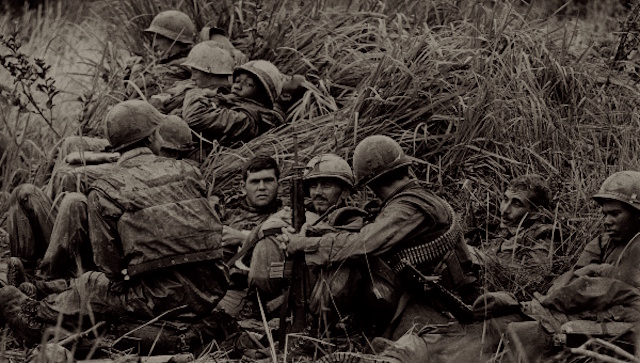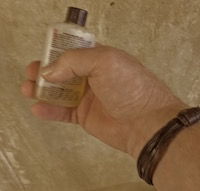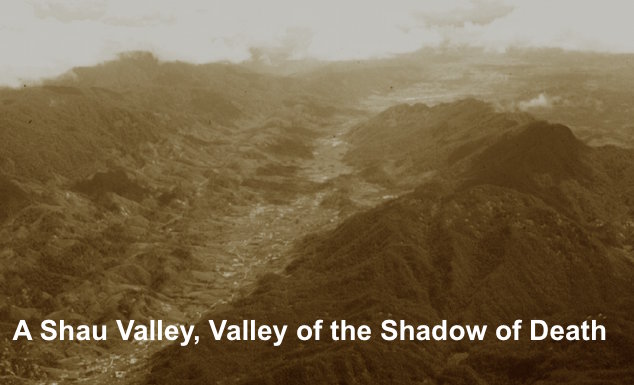They came before dawn. How they came was impossible to imagine. An entire reinforced Marine company, dug into low scrub with marginal cover, waited for them just where they hit. The company used the Starlight scope. The base of fire predicted to be launched from Hill 110 itself, beyond the marshy land on the right flank, was never proven to have occurred. But it didn’t matter much because the firing outward from the Marine perimeter was so overwhelming that nothing could be heard or seen anyway.
I was not terrified. Not in the beginning. I was analytical. Stevens and Nguyen ran back and forth from and to the nearby perimeter giving short verbal reports after each trip. Fusner wanted to know why I didn’t move close to the perimeter to be able to direct fire by sight, but I ignored him. Directing fire was extremely difficult when you were dead, but I didn’t say that. If someone had put a gun to my head I still wouldn’t have gone into that maelstrom of flashes, painful explosions and obvious physical carnage. The Gunny had been right. I wasn’t running but I wasn’t exactly functional communication-wise either.
I called in night defensive coordinates on any presumed bases of fire on Hill 110. The sound of 155mm rounds slamming into the muck and then heaving great chunks of it into the air overrode the shattering staccato blasts from nearby machine guns and grenade explosions. I called for a variety of fuse detonations. Super quick high explosive, radar sensing variable time and even some time delay bunker busting stuff. The H.E. provided penetrating blast waves and ground shrapnel, the variable time rained shrapnel down from above, and the busters served to cave in any and all tunnels dug under the cloying mud. The 155s went to work on the right flank to my preset coordinates while I used Stevens and Nguyen as my quasi-forward observers to guide the 105 fire back on and across the devastated lowland spread of the presumed attack area.
There was no real organization to it all. I could not make out artillery from grenade blasts. The illumination rounds acted like strobe lights to make the whole scene of combat seem like a weird Hollywood horror set. Flashes on and off everywhere from every direction, deafening sounds making hearing anything almost impossible, debris, condensed mist and micro-fragments of mud raining down on everything. I pushed backwards, ever deeper into the crease of my poncho cover, Fusner jammed into the same space with me.
 I worked the radio back and forth to 2/11, Battery D — my battery. Russ was the commo officer at the FDC dedicated to the company’s little battle. Russ and I had been together in the Basic School back at Presley O’Bannon Hall, in Quantico. His last name wasn’t close to mine so, among two-hundred and fifty-eight men in the class; we didn’t bunk together or really get to know one another. He was new in country like me but, apparently, hadn’t pissed off the commanding general on his first night. Russ was a bright and caring kind of guy, or at least I got that impression from our radio traffic. He kept asking how I really was. I never answered but kept trying to sound better, wondering what it was about my radio transmissions that made him ask. After a directing a couple of hundred rounds at my instructions, he said something that told me how smart he was, as well.
I worked the radio back and forth to 2/11, Battery D — my battery. Russ was the commo officer at the FDC dedicated to the company’s little battle. Russ and I had been together in the Basic School back at Presley O’Bannon Hall, in Quantico. His last name wasn’t close to mine so, among two-hundred and fifty-eight men in the class; we didn’t bunk together or really get to know one another. He was new in country like me but, apparently, hadn’t pissed off the commanding general on his first night. Russ was a bright and caring kind of guy, or at least I got that impression from our radio traffic. He kept asking how I really was. I never answered but kept trying to sound better, wondering what it was about my radio transmissions that made him ask. After a directing a couple of hundred rounds at my instructions, he said something that told me how smart he was, as well.
“From our calculations it appears that your own position isn’t where you’ve registered it to be.”
Fusner looked at me. His big round eyes got bigger and rounder, standing out in the dark from his mud-blackened face. I hit the transmit button.
“We’re right where I say we are,” I sent back. If the battery check-fired, or stopped firing, for the safety of the Marines in our unit then the whole unit could be lost.
There appeared to be a full scale attack going on, although I could see nothing. If our position was in question, even our precarious condition would be ignored and the battery would stop firing until the FDC could confirm the proper position of our unit.
“This may be a check-fire situation,” Russ said, and then, “Sorry.”
“Sorry?” I transmitted back, my hand almost crushing the green plastic of the handset. “You tell those assholes in the FDC that if they check fire and I’m still alive, I’m slogging twelve thousand meters back there and I’m going to kill every fucking one of them.”
The radio remained silent for several seconds.
“The artillery net is no place for foul language,” Russ sent back. “The six-actual is on site at the battery. And he knows where you are.”
I couldn’t believe the words coming into one of my bad ears. I held the handset out away from me like it had somehow become the handset to a child’s toy phone. I pushed the button. “Please tell the six-actual for me, on behalf of the whole company, to go fuck himself,” I screamed. Would it really be any worse if the six-actual fired artillery at us because I’d threatened them? I rested the handset down on my poncho cover for a few seconds. I tried my wife’s breathing exercises but I could not get myself back under control. I hadn’t made the threat lightly, and maybe Russ hadn’t either. I would go back there and shoot the bastards if they let the company die out here in the wet misery and mud.
“Did we lose fire support?” Fusner said, leaning so close to me that our foreheads almost touched.
I snapped out of my towering anger and back into the aching misery of our situation. Fusner was right. Screw the emotion. Screw the battery and the FDC. Fuck the six-actual at the battery. Did we still have life-saving artillery support?
“Fire mission, over” I said, pushing the arty transmit button down.
“Fire mission, over,” came right back.
“You still there Russ?” I asked, in relief. We had artillery.
“You still there?” he asked back, emphasizing the ‘you.’ We were going to be okay, maybe.
I went on, laying fire back and forth across the beaten area of the attack grounds, adjusting without observation the 155s, marginally out and around from the registration points I’d had them fire on. The 155 FDC officer didn’t seem to care where we were or our situation. The 155s simply fired where they were called to fire. Maybe it was because they were so far away, I thought later. If I was in deep shit again, I’d use the 155s if they were in range. The trouble with artillery was range.
Once we moved beyond Hill 110 into the A Shau Valley, the VOSOD (valley of the shadow of death), we’d have no artillery at all. Only air, and air was fast, inaccurate as hell and could only stay on station for short periods of time. There also wasn’t enough of it to go around. When you needed air everybody around needed it, too. And then there was the resentment. The air crews were up there in the cool rushing air in almost complete safety, while we were dying in heated misery a few thousand feet below them. Hating air was automatic, except for the Hueys and the crews in them. They were okay — all that according to Stevens and Fusner. I couldn’t seem to catch up with anything as we sat waiting for the dawn. It was like history going too fast and only being able to catch a snippet here and snippet there.
The attack was over. The firing had gone from constant and intense to lightly sporadic, and then nothing. The Gunny came to inform us that the company lost eight more KIA, and we had six wounded awaiting evacuation. Three of the dead had been killed by friendly artillery shrapnel, all of them from First Platoon. He said that most in the company thought I’d saved everyone, except for a few who knew and liked the dead Marines. A couple of NVA kills were confirmed outside the perimeter, with body parts totaling probably thirty more, but those could not be confirmed on the daily report, because of the rules. The artillery beaten zone was a charnel house of human destruction, even by only the briefest inspections before dawn, according to the Gunny.
The Gunny came to sit on a small section of my hooch that wasn’t wet. The drizzle had abated only minutes earlier. Dawn was in the air even if the sun hadn’t yet risen above the horizon. The light would come from over the ocean, illuminating the Philippines before it crossed the nearly one thousand miles of South China Sea to reach Da Nang.
“You did okay, this time around,” he said, taking out a cigarette.
Fusner eased back toward his own hooch, while Stevens and Nguyen remained invisible in the darkness, although I felt them there and paying attention. The company was like a small mid-western town where everyone paid attention to the smallest detail of words and actions while making believe they weren’t at all.
“I had my radio operator come up on the combat net, but it’s not the net I was looking for,” I said matter-of-factly. “You mind giving him the right frequency so I don’t have to spend hours trying them all?”
“You’re not ready yet,” the Gunny replied.
I noted that he’d only used the word ‘sir’ once before, and that was right after I’d called in the first spotting round of white phosphorus. Was I going to have to somehow earn the right to be company commander by passing tests I didn’t know were tests? I said nothing because there wasn’t much I could think of for an answer that wouldn’t make me look weaker, and even more cowardly than I had already demonstrated.
“First Platoon’s gonna be a problem,” the Gunny said, puffing on his cigarette and then spitting little chunks of tobacco into my small moat. “Jurgens, Harrington, Boaz and Nim called themselves The Four Horsemen, like from the old movie. And now Harrington and Boaz are bagged and going out on resupply. That’s not going down well. The fact that they died from artillery you called in, I mean.”
“Maybe they can change their name to the deadly duo,” I replied, without thinking. I heard Stevens muffle a laugh in the darkness just beyond where the Gunny and I sat.
The Gunny ignored my comment. “You know what I mean.”
“I presume you’re telling me this to either warn me or let me know I’ve got to do something, or both?” I asked.
“Just letting you know,” he replied.
I thought for a moment about what the man was really telling me. I was supposed to understand that First Platoon was even more likely to kill me than before, but I was to do nothing about it. Maybe the problem would simply go away after we took Hill 110.
“Stevens, get over here,” I said, raising my voice a bit.
Stevens rushed past Fusner’s hooch to stand waiting at the edge of my moat.
“I need a position and bearings on where First Platoon is down for the remainder of the night,” I ordered.
“You can’t do that,” the Gunny said, rising to his feet and motioning Stevens back with his left hand. Stevens didn’t budge, waiting for me to confirm my order. Or so I presumed.
“They won’t fire on our position,” the Gunny said, emphatically. “Artillery doesn’t do that, ever. It’s part of our rules of engagement.”
I looked at Fusner, who’d approached to stand on the edge of my poncho cover. His eyes were big and round, like before. I said nothing to the Gunny, just letting the time run until dawn. The Gunny had just revealed that he didn’t know about our real position in relationship to the battery, or probably anywhere or anyone else, for that matter. I wasn’t going to tell him otherwise. I had no intention of calling in a mission on First Platoon, except deep down in the confines of my darkest emotions. But I would have to do something. Something would either come up or I would be dead. I was going to be dead anyway and I knew it in my bones. The NVA were well-equipped, supported and tenacious in numbers. The Marines around me were the same.

“What’s the battle plan for tomorrow?” I asked the Gunny, changing the subject. First Platoon was now my problem and I understood that. “And when’s the CP meeting scheduled with platoon commanders before we cross the line of departure?”
“Dawn,” the Gunny answered. “We can meet right here, if that’s okay with you, and then I’ll see if Sugar Daddy can make it.”
If it was okay with me… Like I was anybody at all, except the guy hiding in his hooch after running away, who happened to be able to call effective artillery. I wasn’t even allowed to listen in on the combat net, much less issue any orders. And then there was the matter of First Platoon and Sugar Daddy. The company had a whole platoon of black Marines and I had not seen even one. How was that possible, I wondered? And why was I meeting Sugar Daddy? What was his role? How could I avoid telling him that we didn’t have black units in the Corps and that he had to disburse them into the other platoons? I didn’t even know his rank, not that rank seemed to be that important in the company I’d been dropped into.
“I’ll be back,” the Gunny said, tossing his cigarette into my little moat without field stripping it or even making any effort to put it out.
When he was gone Stevens leaned forward. Only when he whispered and I understood him did I realize that my hearing was coming back.
“You still want the data on First Platoon?” he asked.
“Fuckin’ A,” I replied.

Elephant Hair Montagnard Bracelt
Stevens and Nguyen went back to their hooches to get ready, or so I thought until a few seconds later. Stevens pointed at me and Nguyen stepped forward with both hands held out. I looked down but it was still dark and I couldn’t see or imagine what he might have. When he noted that fact, Nguyen took a small object out of his right palm and held it up. I squinted to make out a black bracelet composed of some kind of strands. Nguyen motioned toward my right arm. When I brought it up he reached over gently and held my wrist. Slowly, he expanded the bracelet with both hands and then slid the thing up over my hand and onto my wrist. He tightened it by sliding something.
“Montagnard,” Stevens said. “The bracelet will protect you. It’s only given to great warriors of his tribe. He’s not Vietnamese.”
“Great warriors,” I whispered to myself, trying to figure out how the thing adjusted. I wondered how the great warrior with Stevens could so mistake what I was?
“What is he if he’s not Vietnamese?” I asked, shaking the bracelet. It would take some getting used to but I could not take it off, I was certain, without hurting the man’s feelings.
“Montagnard, of course, sir. The mountain people.” Stevens said. “We’re now in his area of operations.”
I nodded toward the Montagnard, not knowing what else to do. I now had my first real amulet against the forces of evil, other than a Lucky Strike. The whole thing had to be hilariously funny but I couldn’t find the humor in it anywhere. I pushed back into the poncho cover, ate some more crackers and waited for what dawn had to bring.
Where was John Wayne when I needed him?
30 Days Home | Next Chapter >>
















Jim, I find it kinda therapeutic to read your stories.
I returned in March of 1970 after a full year with HHC 3/1 1Mar Div. As one of 5 commo repairman in a unit that only rated one, I was given several chances to get out with the line companies when temp help was needed as RTO.
To be truthful, no one had ever asked me what I had to do in Nam. Not even my Dad who was a WWII Navy vet. Even my wife of 46 years has never asked of any tails of my service.
It’s good to be able to actually see and read stories of another grunt that is able to share his stories. Maybe someday I will start writing down some of my tall tails.
Thanks for sharing and Semper Fi fellow Marine.
John: The problem is that guys coming back from there who were really in combat cannot simply tell what happened.
The stories, like yours, the real ones, are simply not believable because they run into such opposition
from existing mythology driven by television, movies and guys coming back who didn’t see real combat but
love to tell heroic stories about it. Most stories are like yours, the real ones, where the guys out there
in the mud and shit didn’t feel heroic at all and were just fighting to stay alive and finish a short timers
calendar. Semper fi, my friend. I, and others like me understand and want to listen…
Jim
I have read with great interest.Thanks for sharing. My hat is off to you Sir !
Thank you Steve. It is so nice to get comments like yours. It’s so risky to
tell this kind of a story because there’s too much unbelievable truth in it, and
most of it is not that ‘heroic’ kind of truth. I wondered when I started if anyone
would care at all…
Thanks again,
Semper fi,
Jim
Do you still have The Bracelet, James?……..Just wondering..
Wear it every day, Kay. Elephant Hair is kind of tough stuff. Nobody really
knows what it is, for the most part. But then nobody really knows what lurks behind
my rather innocent expression, either. Nguyen went on to have three kids, repatriate
to live in San Clemente, CA not far from me at the time. His daughter became best friends with
my daughter. Her nickname was Hamburger, she loved them so much. Life is so unpredictable….and strange.
Jim
You have ability to take the reader with you as you tell of your war experience . You have a rare talent and I appreciate your writing skill .
Thank you Fred. just trying to tell about the feel of it as well as the
analytical stuff. Thanks for the support.
Semper fi,
Jim
I was laughing out loud at rembering getting my ass chewed several times by the people at saigon suport command for using profanity on a military radio net. The first time it happened I was for a lack of words I simply coukd not believe there were peoole a 100 miles away listening in that coukd possibky give a shit about me cursing on a radio.
A few days later after a 40 lb tank mine blew away another companys 3/4 in fro t of me and I calked back to the fsb for a dust off. The CO (a major) took the mike away and called back and asked if our incident really warranted the use of a medivac and asked if we coukdnt evacuate our people by a trac vehicke. Friends of the criticial wounded were standing beside me and I went ballistic using every 4 letter I hadin my vocabukary , I informed him of the condition of the men and that I wanted a GD dustoff abd I wanted the MF now . Ifully expected an articke15 but I naver heard a word from the radio police or from the Major. The major showed up about an hr after we had medi vacd the wounded with his driver in his jeep. One of the buddies of the wounded
jumoed into my 3/4 and swung our 60 toward his jeep. The majors driver
saw what was about to happen and slammed on the brakes got reverse gear and left in reverse in a cloud of red laterite dust.
How could I have forgotten the term “distoff?’ Good God, yes! Thank you Lucky. Later, in the
CIA a distaff came to mean a low level flyby of a supersonic jet to let those around you know you
had that kind of power. But not in the Nam. Thanks for your heartfelt comments and your own experience.
It was astounding to get hauled in on the carpet for foul language when men were dying around me.
Semper fi,
Jim
Very well written. You could seethe artillary and what you were going through.
Thanks for commenting Robert. Yes, I can still see and here that stuff today. I don’t flinch at loud sounds or any of that but
sometimes late at night I look out there and kind of make believe what that night fighting was really like. Artillery in the day
is so much easier and more ‘antiseptic’ if you get the meaning. And it was even fun in Oklahoma in training. Cool stuff. You don’t think about
killing people or the maiming that seems worse….
SEMPER fi,
Jim
That’s supposed to be kon Tum not Kentucky.
Got it, my friend,
Jim
Bong Song, Happy Valley nice places to hang out. I was in Kentucky end of 64 then a lot a of places even Loas covering LLRP extractions. Saw Chinese regular Army once. Really enjoying your story. I never told anyone but my Dad about it.
Daniel, you are a class act anyway so I don’t need to say that again. Yes, I got the Kontum without you having to spell it out. At first I was trying to think of an operation called Kentucky, because some of those operations were named some pretty strange things. I heard about a few Chinese and Russians too but never saw any myself. Thanks for the comments and ‘coming out’ on here. Telling people about real combat, even family, can be a very painful waste of time. Remember, what you went through, like I am laying out here, is mostly not believable by people who didn’t go or weren’t really in the shit.
Semper fi,
Jim